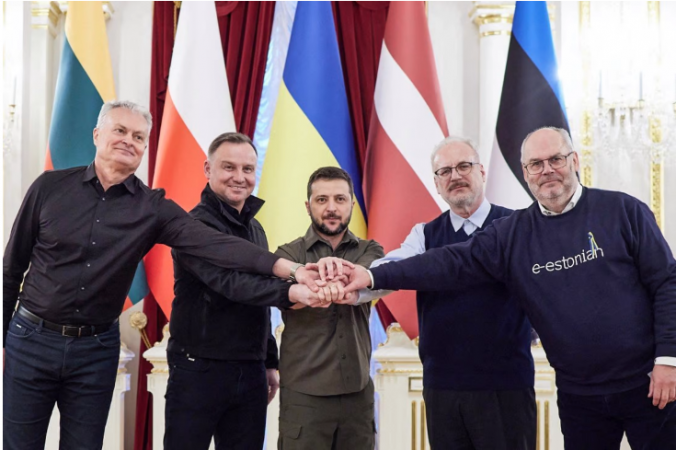
EU: After Lithuania left China's 16+1 trade grouping of Central and Eastern European countries last year, Estonia and Latvia announced on Thursday that they too had left.
The foreign ministries of the two countries made nearly identical statements on their websites, "committing to continue striving for constructive and pragmatic relations with China, both bilaterally and through EU-China cooperation for mutual benefit, in accordance with international law." respect, based on human rights, and international rules-based order."
However, a statement on the website of the Latvian ministry said that "Latvia has decided to stop its participation in the cooperation framework of Central and Eastern European countries and China."
While Estonia has been a member of the group since its inception in 2012, the Estonian ministry noted that it had not participated in any meetings since the summit in February last year.
A request for comment from the Chinese mission in the European Union was not immediately met.
Beijing created the forum ten years ago as a 16+1 grouping, which became a 17+1 grouping in 2019 after Greece joined. Its purpose was to promote trade and investment.
However, it recently lost steam. Lithuania's Baltic neighbors, who left the group last year citing heavy economic consequences, were expected to follow.
After Chinese President Xi Jinping and Russian President Vladimir Putin declared a "no borders" friendship in February, China's suspicions have grown across the region.
According to Sarah Kreps, a professor of government and law at Cornell University, Putin later waged a war against Ukraine and recent military tensions in the Taiwan Strait after US House Speaker Nancy Pelosi's island visit led more countries, including Latvia and Estonia, to the United States. , "to establish themselves in special camps like in the Cold War."
Both the nations, according to him, "are trying to signal very clearly that they are in the pro-democracy camp and they do not want to ally with nations that are seen as acting against democracy. "
They want to consider how they can demonstrate their loyalty so that in the future, if they are exposed, [the US and its Western allies] will take this into account and make sure they are rewarded with a strong defense. Go," Kreps continued.
Beijing sent its regional envoy Huo Yuzhen to visit the capitals during the spring in an effort to repair relations that had deteriorated as a result of Russia's invasion of Ukraine and China's alleged support of Moscow's territorial claims.
Beijing last month hosted a meeting with 11 countries in the region, reflecting declining interest in engagement with China across Central and Eastern Europe.
According to a diplomatic source familiar with the occasion, Hungary offered to host a "commemorative ministerial" in Budapest this year to mark the tenth anniversary.
Another cause of concern in the region has been China's alleged pressure on Lithuania to host the controversially named Taiwanese office.
Vilnius last year allowed Taiwan to establish a "Taiwan Representative Office" for diplomatic and commercial purposes. Instead of referring to the self-governing island as a sovereign nation and risk upsetting Beijing, other countries have used the term "Taipei".
China reportedly responded by imposing trade sanctions on Lithuania. As a result, the European Union has filed a World Trade Organization (WTO) case against China.
Vilnius will open its first business office in Taipei next month. Despite rumors that it could become another flashpoint in relations between the EU and China, Lithuanian officials have remained silent on what it will be called.
The most prominent member of the European Union who defended Pelosi's visit to Taiwan last week was Lithuania's Gabrielius Landsbergis, who claimed it had "opened a very wide door for Taiwan, and I am sure other defenders of freedom and democracy." Will be running through very soon."
Lithuania's ambassador to China Diana Mikaevisyn, who was expelled from that country last year over the Taiwan issue, reaffirmed her support for Pelosi's visit.
“We all agree that the President of the US Congress has visited Taiwan before, but he said it is about principles. It has happened at the same level before. We value the principles of separation of powers and democratic countries. Let's see these as principles—indeed, important principles in existence—and in that sense, I can agree with China that what has happened is about principles.
According to Andrew Mertha, director of studies for China at the Johns Hopkins School of Advanced International Studies, Latvia and Estonia's actions demonstrate a willingness to maintain diplomatic relations with Beijing, despite their geopolitical allegiances.
"China can continue to exploit differences between Eastern European countries and their more developed Western neighbors, as well as separately" relations between 16+1 countries,” he said. Latvia and Estonia, on the other hand, are trying to strengthen their security by voting with their feet.
Mertha continued, "They are indicating that they also understand that there are subtle differences between Beijing and Moscow about their 'spheres of influence' that these Baltic countries can take advantage of, if not exploit outright. They claim to seek "constructive and practical relations" with Beijing.
We should not be shocked, he said, adding that Beijing should also not be overly concerned.
Ukraine to Implement 107 Regulations Under Association Agreement
Russian coal imports prohibited by the EU after the transition ends
As COVID Curbs Ease, China's July Auto Sales Extend Recovery
UN trade body calls for curbing cryptocurrencies in developing countries